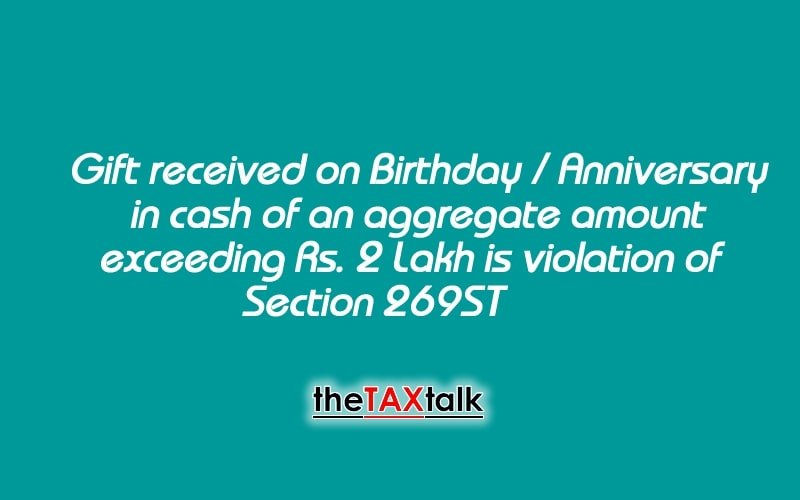![]()
Gift received on Birthday / Anniversary in cash of an aggregate amount exceeding Rs. 2 Lakh is violation of Section 269ST
There are numerous provisions in the Income Tax Act – 1961 which prohibits cash transactions. One such provision is there by way of section 269ST which was introduced in the year 2017 by the FA-2017. The provision is very simple in drafting and can be easily understood. It reads as under:
‘269ST- No person shall receive an amount of two lakh rupees or more—
(a) in aggregate from a person in a day; or
(b) in respect of a single transaction; or
(c) in respect of transactions relating to one event or occasion from a person,
otherwise than by an account payee cheque or an account payee bank draft or use of electronic clearing system through a bank account:
Provided that the provisions of this section shall not apply to—
(i) any receipt by—
(a) Government;
(b) any banking company, post office savings bank or co-operative bank;
(ii) transactions of the nature referred to in section 269SS;
(iii) such other persons or class of persons or receipts, which the Central Government may, by notification in the Official Gazette, specify.
Explanation.—For the purposes of this section,—
(a) “banking company” shall have the same meaning as assigned to it in clause (i) of the Explanation to section 269SS;
(b) “co-operative bank” shall have the same meaning as assigned to it in clause (ii) of the Explanation to section 269SS.’.
Contravention of section 269ST would result in levy of penalty under section 271DA, which reads as under:
- If a person receives any sum in contravention of the provisions of section 269ST, he shall be liable to pay, by way of penalty, a sum equal to the amount of such receipt
Provided that no penalty shall be impossible if such person proves that there were good and sufficient reasons for the contravention. - Any penalty impossible under sub-section (1) shall be imposed by the Joint Commissioner.
Section 269ST is a step to promote less cash economy & restricts the cash transactions in excess of Rs. 2 Lakh from a person in a single day or in respect of any single transaction or in respect of transactions relating to one event or occasion from any person.
The Finance Minister, in the parliament, justified the introduction of introducing section 269ST with following words:
“In India, the quantum of domestic black money is huge which adversely affects the revenue of the Government creating a resource crunch for its various welfare programmed. Black money is generally transacted in cash and large amount of unaccounted wealth is store and used in form of cash”
However, though the section is simple in reading, the consequences and interpretation may not be so. There are situations where it may result in absurd consequences. One such instance could be on the occasion of celebration of Birthday, Anniversary or Marriage etc.
Let us consider a case of a birthday party wherein a person has invited a number of guests and they have gifted the amount in cash to the birthday boy or a girl.
Let us imagine that the person has received Rs. 2001/- from 100 persons, aggregating to 2,00,100/-. Will it be a violation of section 269ST?
Section 269ST bars following three transactions for Rs. 2 Lakh in cash:
(a) in aggregate from a person in a day; or
(b) in respect of a single transaction; or
(c) in respect of transactions relating to one event or occasion from a person,
More categorically, it bars “in respect of a single transactions”. Birthday, Anniversary or marriage is obviously a “single event”. What needs to be checked is whether a single event is to be counted from the perspective of giver or taker?
Section 269ST is applicable to the recipient and not the giver. The penal consequences are also applicable to the recipient. It means everything needs to be viewed from the angel of “Recipient” and not giver.Or taker, the marriage is a single event. Obviously, the recipient if receiving more than Rs. 2 Lakh in cash will be in violation of section 269ST.
Further, there is no mention of the word “a person” in this limb which simply mentions “ (b) in respect of a single transaction;” whereas first and third party specifically mentions “a person” and it reads as “(a) in aggregate from a person in a day;” or “(c) in respect of transactions relating to one event or occasion from a person”,
This may not have been the intention / logic but the way the section is drafted, even genuine Transactions in Cash would be affected by Section 269ST unless and until government provides certain genuine exclusion by notification.
Though the wording of the new law is simple, the outcome would not be so. Though the object is noble, its implications would be draconian. Further, the section is unfettered & it places restriction on the recipient (& not on payer). The nature & character of receipt is irrelevant i.e., exempt income or taxable income etc. There is no exemption even for sale of agricultural produce.

